OUR STUDENT'S STORIES
We have asked some of our students to share their views and experiences whilst on the SBM CDT programme.
TRAINING TO BE A CHEMIST IN INDUSTRY
Miranda Wright (2014 cohort)
Miranda recently completed her DPhil working in medicinal chemistry with Prof Paul Brennan and Dr Akane Kawamura and recently began working at Vertex Pharmaceuticals. We asked Miranda to tell us about her experience as student in the SBM CDT, and how it allowed her to pursue new challenges outside of academia.
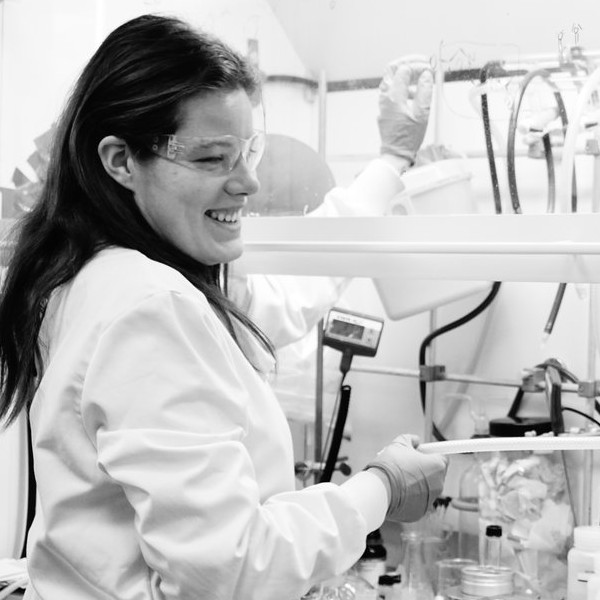
Being part of SBM provided me with many opportunities during my DPhil, which have allowed me to make an informed decision about my future career in chemistry.
"I have thoroughly enjoyed my DPhil experience on the Synthesis for Biology and Medicine programme which has been both challenging and rewarding. During the taught course, I gained an in-depth training in organic chemistry and its importance at the molecular level in biology and medicine. The courses were interactive and engaging and prepared me well for the start of my research projects. Not only did the programme enhance my practical and theoretical skills but also developed my transferable skills.
The lab rotations were a great way of experiencing how synthetic chemistry can be applied to solve different cutting-edge research problems, in my case developing chemical probes for epigenetic targets and the discovery of new classes of antibiotics. It was useful to have a taster of the different projects to determine what area of chemistry motivated me the most.
I particularly valued the interaction with the industrial partners who provided helpful advice for my project. I was very fortunate to have the opportunity to undertake a placement with one of the industrial partners, Janssen Pharmaceuticals. This was an invaluable experience to gain a greater understanding of the application of chemistry in industrial drug discovery programmes. I had access to some of the best facilities and equipment to aid my chemistry. Interaction with industrial chemists also allowed me to gain a greater understanding of life as a chemist.
The lab rotations were a great way of experiencing how synthetic chemistry can be applied to solve different cutting-edge research problems, in my case developing chemical probes for epigenetic targets and the discovery of new classes of antibiotics. It was useful to have a taster of the different projects to determine what area of chemistry motivated me the most.
I particularly valued the interaction with the industrial partners who provided helpful advice for my project. I was very fortunate to have the opportunity to undertake a placement with one of the industrial partners, Janssen Pharmaceuticals. This was an invaluable experience to gain a greater understanding of the application of chemistry in industrial drug discovery programmes. I had access to some of the best facilities and equipment to aid my chemistry. Interaction with industrial chemists also allowed me to gain a greater understanding of life as a chemist.
During my time in the Brennan lab, the interdisciplinary nature of my research project enabled me to broaden my skill set which was beneficial for my future in research. I had the pleasure of working with talented scientists who were always available for support and advice. Although my research project had its highs and lows, it was worthwhile for those moments when you realised that you had made a breakthrough. I hope that the results obtained from my project will provide a significant contribution to the field and be valuable for the wider research community.
Being part of SBM provided me with many opportunities during my DPhil, which have allowed me to make an informed decision about my future career in chemistry. I am very excited to start my role as a medicinal chemist at Vertex Pharmaceuticals and to put into practice everything that I have learnt on my DPhil journey."
Being part of SBM provided me with many opportunities during my DPhil, which have allowed me to make an informed decision about my future career in chemistry. I am very excited to start my role as a medicinal chemist at Vertex Pharmaceuticals and to put into practice everything that I have learnt on my DPhil journey."
A JOURNEY TO MOUNT SINAI
Moses Moustakim (2014 cohort)
Moses, the first student to graduate from SBM CDT, describes his experience in the programme and the how the nature of SBM CDT has allowed him to make a successful transition into a postdoctoral position at the Icahn School of Medicine at Mount Sinai, New York, USA.
"In addition to the completion of a doctoral degree at the core of the Synthesis for Biology and Medicine CDT programme, many other aspects also made the overall experience highly rewarding. The theoretical aspect of the course covered during the first year was a fantastic way for me to learn more about the state of the art in areas of synthetic chemistry I was less familiar with. Close interactions with the SBM industrial sponsors and partners allowed me to grow my network and ultimately led to me securing a 4-month internship at Vertex Pharmaceuticals in the USA which I was able to carry out during the course of my DPhil.
My DPhil research focus was at the intersection of synthesis and medicinal chemistry, true to the nature of the SBM CDT, and as such I was fortunate to gain the mentorship of two supervisors. The collaborative nature of my DPhil work was highly stimulating as I was able to interact with and learn from two research groups. This led to great strides in the learning process throughout my doctorate both in terms of how to tackle scientific problems, in addition to effectively working with other researchers. I was fortunate to work on some very interesting scientific problems which we were able to tackle effectively, ultimately leading to multiple publications.
Stimulated by the translational nature of the work I was exposed to during my DPhil, I began seeking out research job opportunities in my final year of my DPhil. I was highly motivated to seek out opportunities in the USA having been briefly exposed to working in the USA during my internship at Vertex.
My DPhil research focus was at the intersection of synthesis and medicinal chemistry, true to the nature of the SBM CDT, and as such I was fortunate to gain the mentorship of two supervisors. The collaborative nature of my DPhil work was highly stimulating as I was able to interact with and learn from two research groups. This led to great strides in the learning process throughout my doctorate both in terms of how to tackle scientific problems, in addition to effectively working with other researchers. I was fortunate to work on some very interesting scientific problems which we were able to tackle effectively, ultimately leading to multiple publications.
Stimulated by the translational nature of the work I was exposed to during my DPhil, I began seeking out research job opportunities in my final year of my DPhil. I was highly motivated to seek out opportunities in the USA having been briefly exposed to working in the USA during my internship at Vertex.
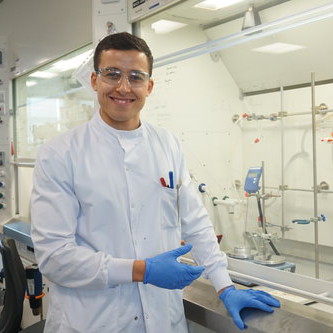
The theoretical aspect of the course covered during the first year was a fantastic way for me to learn more about the state of the art in areas of synthetic chemistry I was less familiar with.
I was fortunate to be offered a Postdoctoral Fellowship in the USA 6 months prior to the end of my DPhil. With the support of both of my supervisors I was able to finish up early, write, submit and defend my thesis in a few months before heading over to the USA to continue the learning journey. I am very grateful for all of the inspirational people I have met during my time at Oxford and look forward to returning to visit in the future. I would highly recommend the SBM CDT as a platform for transitioning into doctoral level research. The directors, management team, industrial sponsors and partners along with all of the associated supervisors have created a very special programme that I hope continues long into the future!"
SHARING PASSION FOR CHEMISTRY
Minh Tran (2014 cohort)
Keen to share her passion for chemistry, Minh had her first encounters with Outreach and Public Engagement while she was still an undergraduate student here at Oxford. Since then, she has been repeatedly recognised with prizes and awards for her outstanding contributions to the area. We asked Minh to tell us about some of the most recent activities she has participated in and to explain us what drove her to get involved with Outreach & Public Engagement.
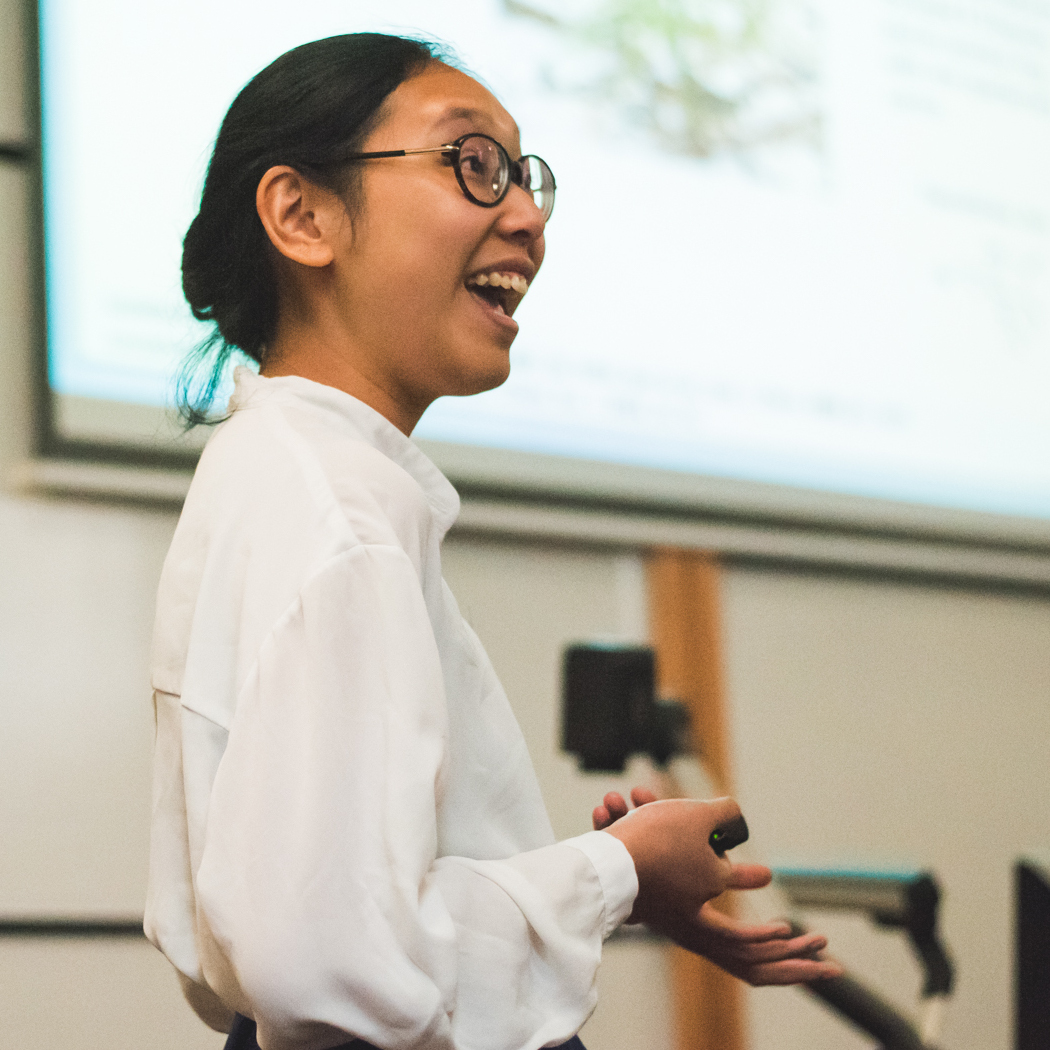
Outreach activities certainly provide another skill set within PhD training, and serve the important purpose of popularising research science to young pupils and the public in general.
"With a multitude of outreach and public engagement bodies around Oxford, I always have the opportunity to be engaged with various activities in dfferent formats. The most recent public engagement session was a Facebook Live interview with Oxford Sparks to discuss ‘Can we make something from nothing’, alongside Research Fellows in Astrophysics and Computer Science. As a conscious effort to aspire pupils to science, especially those from schools with little Oxbridge history, there are plenty of Science Festivals and Open Days around Oxford. I often volunteer at such events, for example, by running the Epigenetics Game with the Royal Society of Biology at the Museum of Natural History.
I have been involved with outreach since undergraduate, and first volunteered as a mentor on the SchoolsPlus programme, under OxfordHub. We organised and ran weekly afterschool clubs for pupils at the Oxford Academy to recap and expand concepts from their taught lessons, help with university applications, and run experiments outside the syllabus. Besides the helpful training provided by TeachFirst and The Brilliant Club, I valued the opportunities to work with and aspire young pupils to science at higher education, which became the fundamental reason for my continuation of outreach.
Having participated in a number of activities throughout the years, the enjoyment and excitement come afresh each time from working with new groups of organisers and volunteers, and meeting different sets of pupils or the public with varying knowledge and questions.
I have been involved with outreach since undergraduate, and first volunteered as a mentor on the SchoolsPlus programme, under OxfordHub. We organised and ran weekly afterschool clubs for pupils at the Oxford Academy to recap and expand concepts from their taught lessons, help with university applications, and run experiments outside the syllabus. Besides the helpful training provided by TeachFirst and The Brilliant Club, I valued the opportunities to work with and aspire young pupils to science at higher education, which became the fundamental reason for my continuation of outreach.
Having participated in a number of activities throughout the years, the enjoyment and excitement come afresh each time from working with new groups of organisers and volunteers, and meeting different sets of pupils or the public with varying knowledge and questions.
Overall, the various experiences have taught me the flexibility in delivering my ideas to different groups of audience, how the engagement can be kept by linking to applications in everyday’s life, and not to be afraid to explain unfamiliar concepts: the public is very keen to learn. Outreach and Public Engagement activities certainly provide another skill set within PhD training, and more importantly, they serve the important purpose of popularising research science to young pupils and the public in general.”
CHEMISTRY ON THE OTHER SIDE OF THE POND
Nick Parker (2015 cohort)
Industrial interaction is a key part of the SBM CDT programme, with every student encouraged to spend a secondment at an industrial partner. We asked Nick, a final year DPhil student, to tell us about his recent internship experience working for Vertex Pharmaceuticals in Boston
"Having never studied nor worked outside the UK, I wanted to experience what working in industry would be like in a different country. Through the SBM CDT programme, I was made aware of an opportunity for a three month internship at Vertex in Boston. I thought this would be an excellent chance to both broaden my knowledge of medicinal chemistry and gain insight into work life in the US.
After a relatively short interview process and a slightly longer J-1 Visa application process, I arrived in Boston ready to get started on my project. My typical weekly activities in the lab were broadly similar to those in academia; however there was a much greater degree of cooperation and collaboration on individual projects which helped me to quickly improve my technical skills. Additionally there were plenty of professional development opportunities in the form of both lectures and workshops, as well as more informal social events which were often useful to bounce ideas around. Regular fortnightly team meetings and an internal poster session helped me communicate my work internally to both scientists and non-scientists alike within the company, and helped me to see the wider context behind the work I was performing.
Work/life balance was usually pretty good as I would typically be finished by around 5 in the evening, leaving plenty of time to relax in the evening. On my weekends I took advantage of being in Boston to visit the many cultural and historical sites of interest, including the Old State House and Boston Common.
After a relatively short interview process and a slightly longer J-1 Visa application process, I arrived in Boston ready to get started on my project. My typical weekly activities in the lab were broadly similar to those in academia; however there was a much greater degree of cooperation and collaboration on individual projects which helped me to quickly improve my technical skills. Additionally there were plenty of professional development opportunities in the form of both lectures and workshops, as well as more informal social events which were often useful to bounce ideas around. Regular fortnightly team meetings and an internal poster session helped me communicate my work internally to both scientists and non-scientists alike within the company, and helped me to see the wider context behind the work I was performing.
Work/life balance was usually pretty good as I would typically be finished by around 5 in the evening, leaving plenty of time to relax in the evening. On my weekends I took advantage of being in Boston to visit the many cultural and historical sites of interest, including the Old State House and Boston Common.
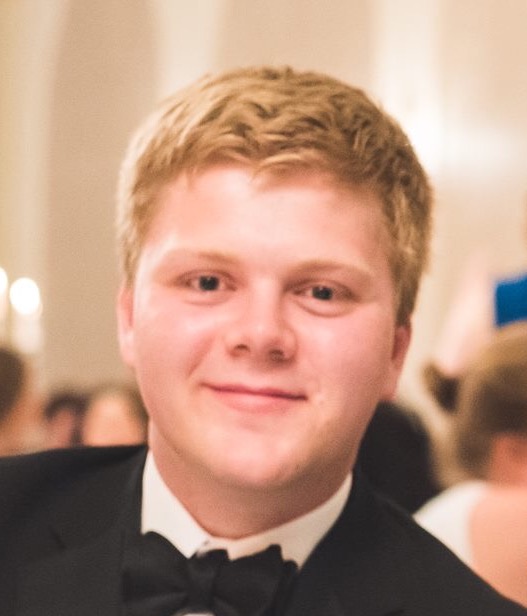
The opportunity to network and interact with so many scientists and non-scientists from around the world working towards a common goal was very inspirational
By the end of my internship, I had significantly widened my knowledge of medicinal chemistry as well as having a better understanding of the context within which I was working. The opportunity to network and interact with so many scientists and non-scientists from around the world working towards a common goal was very inspirational, and I felt like I made several long term connections. Overall, I would certainly recommend it to future students as a thoroughly enjoyable opportunity!"
BRINGING A CONFERENCE TO LIFE
Michael Tilby (2016 cohort)
The second Oxford Synthesis Summer Conference – OSSC2018 – took place in Oxford on 25th and 26th July. Held over two days for graduate students and early career-researchers, the OSSC2018 focused on the future of synthetic chemistry and progressing a career in research. The conference was attended by over 300 delegates from more than 40 institutions, creating a diverse forum to discuss chemical synthesis. We asked Michael, from the organising committee, to tell us a bit more about his experience bringing the OSSC2018 to life.
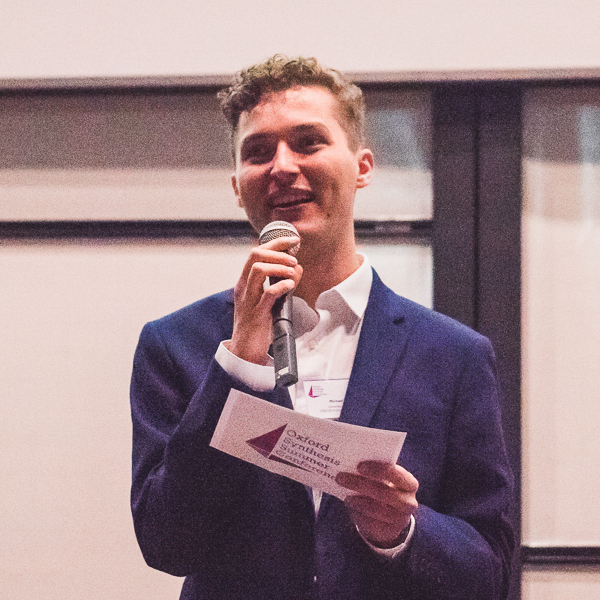
It was a great privilege to be involved in OSSC2018 and learn how to run such a large event with a high level of professionalism.
"The programme consisted of inspirational talks from five world-renowned academics including Prof. Donna Blackmond, Prof. Stephen Buchwald, Prof. Ben Davis, Prof. Benjamin List and Prof. John Sutherland. Each speaker delivered a captivating talk based on the development of their own individual career, which incorporated the challenges that need to be overcome in chemistry research. Also, several of the speakers partook in a panel discussion, where audience members were able to ask questions to these top academics on the future of synthesis and how to be a successful researcher.
Furthermore, over 20 students themselves presented their own success stories with a concise rapid-fire presentation. The poster session provided further opportunity for students to showcase their research and discuss a range of topics within chemistry. Prizes for best posters and an audience prize for best rapid-fire presentation were awarded at the end of the conference.
Crucial to the success of OSSC2018 are the SBM CDT students of the 2015 and 2016 cohorts who composed the organising committee. This team of 14 were involved in a range of tasks, from coordinating the programme, liaising with invited speakers, obtaining sponsorship for the conference and even introducing the speakers on stage. Personally, as part of the organising committee, it was a great privilege to be involved in OSSC2018 and learn how to run such a large event with a high level of professionalism."
Furthermore, over 20 students themselves presented their own success stories with a concise rapid-fire presentation. The poster session provided further opportunity for students to showcase their research and discuss a range of topics within chemistry. Prizes for best posters and an audience prize for best rapid-fire presentation were awarded at the end of the conference.
Crucial to the success of OSSC2018 are the SBM CDT students of the 2015 and 2016 cohorts who composed the organising committee. This team of 14 were involved in a range of tasks, from coordinating the programme, liaising with invited speakers, obtaining sponsorship for the conference and even introducing the speakers on stage. Personally, as part of the organising committee, it was a great privilege to be involved in OSSC2018 and learn how to run such a large event with a high level of professionalism."
The OSSC2018 was a great success, stimulating a range of discussions on the future of synthesis within scientific research and the important role that current graduate students will play in this future. We hope to see you all in 2020!
 "/>
"/>
